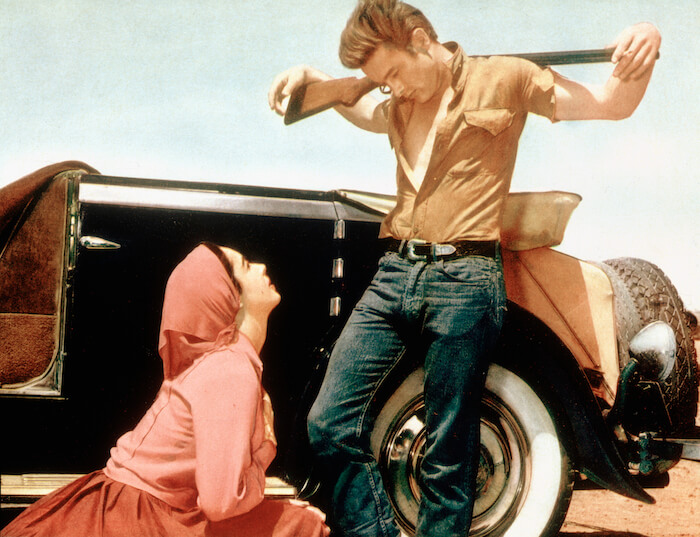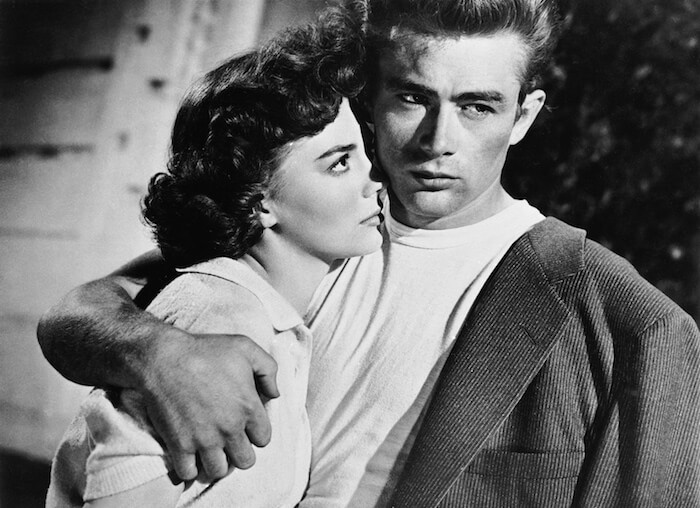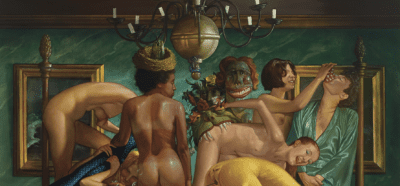James Dean’s Performance Anxiety


September 30-October 6 at Film Forum
Perhaps it’s because he starred in a film entitled Rebel Without a Cause (1955), perhaps because he was an inveterate auto racer who perished when he crashed his Porsche just a month before the film’s release, but for some reason, society remembers James Dean as the embodiment of “cool,” a rebel, even a delinquent teenager. By the mid-1950s, the concept of “masculinity” was undergoing a change even among Hollywood’s bona fide macho men: In High Noon, Gary Cooper’s determined but outnumbered sheriff needs help from his Quaker wife to restore order. John Wayne was quick to criticize the film for that reason, but even he found his emotional side playing a larger part in his films, never more than the end of The Searchers, when he lifts Natalie Wood to the sky after preparing to kill her for the preceding hour. Marlon Brando had paved the way for a more timorous masculinity, and Dean took that to an extreme. His roles—a son competing for dad’s affection; a mischievous teen more concerned with standing up to codes of honor than dignity; a rags-to-riches farmhand who builds and then crumbles an oil empire—hung precariously on the balancing point between macho and sensitive, but Dean played his parts with a warmth, sincerity and a theatricality that illuminates the everyday performance that comprise a tough-guy persona, and even the cool rebel that Dean is remembered as. His performances reveal not merely a soul misunderstood, but in their histrionics also diagnose society’s constant need to fashion an image around itself and its institutions.
Dean’s first film was Elia Kazan’s East of Eden (1955) playing Cal, who attempts to win his father’s favor over his brother Aron with a successful bean growing business. “Cal and Aron” is a corruption of “Cain and Abel,” and the film plays up the Biblical allegory of John Steinbeck’s source novel, with Dean granting a sympathetic rather than vindictive edge to Cain/Cal. His rebellion is moody and self-pitying, and his chemistry with Abra (Julie Harris), who gives one of the precious few performances in which a movie character believably falls in love, is that of an uninhibited romantic. The lasting images of East of Eden are not the tormented Cal of the beginning, or even the spurned Cal accused of war profiteering by his own father, but those of Dean and Harris roaming the carnival, first attempting to respect social boundaries (Harris’s character is involved with Cal’s brother), then gradually finding themselves unable to resist as they kiss atop a Ferris wheel. Aron proposes to Abra to win back Adam’s affection, but that he is presented as the villain in this moment next to the far warmer Dean character allegorically casts the murderous Cain in a more sympathetic light. The misunderstood rebel is brought down by optimism and love rather than by more masculine traits.
While the similarities to Brando’s role in On The Waterfront seem clear enough and brought forth comparisons between the two stars, Brando’s great innovation and influence is his realism; Dean’s, less fashionable but no less remarkable, is his theatricality. That theatricality reaches revelatory heights in Rebel Without a Cause, in how incisively he undercuts traditional masculinity as well as the constant need to “perform” a part. While a tight t-shirt, a leather jacket and jeans may have embodied the counterculture at the time, what we see in the movie is a high school boy lured into rather than provoking a knife fight, a new kid in town struggling to establish a cool image, and someone desperately trying to escape patriarchal constructs. The infamous “chickie run” sees his Jim Stark following the lead of his competitor as he practices rolling out the car door and rubbing dirt on his hand, and Nicholas Ray’s direction of the sequence—with the spotlight on Dean as he arrives, to the marvel of wide-eyed spectators—announces Jim’s action as theatrical and performed for the favor of others. That Jim and Judy (Natalie Wood) cannot help but recreate the very same dynamic that behooves all that they rebel against is the film’s great tragedy. By contrast, Dean’s warmth with Sal Mineo’s Plato, the earnest, closeted loner, is the film’s most revealing truth.
Dean plays the part in visible hesitations and rushed readings evoking a kid simply trying to conjure the “right answer,” or else in overdramatic gestures that, rather than breaking the film’s verisimilitude—Ray was always an expressionist—instead bring the tensions between image and performance, masculinity and honesty, love and embarrassment, to the forefront, none more memorably than in the infamous “you’re tearing me apart” at the feet of his parents. To this day, no other film has so effectively captured the measures teens take to concoct or preserve their image, nor the winsome kindness they are capable of in those rare, isolated scenarios in which they can be themselves. Because Dean plays these contradictions so close to the surface, his recreation of bourgeois society with Natalie Wood renders not as hypocritical but as tragic; they are able to see through facades but are nevertheless so constrained by visible modes of existence that genuine alternatives are out of reach.


Both titles will screen a handful of times at Film Forum in the coming week, but it is particularly appropriate that his final film, Giant (1956), is receiving a full, week-long revival run. While Rebel seems to subvert the “James Dean” image, Giant hardly pays it any mind. The distance it places between the perception of the actor and his character has an effect similar to the chickie run sequence, exposing the arbitrariness and inauthenticity of the star image.
In Giant, Dean plays Jett Rink, a farmhand on the enormous Benedict ranch hoping to make something better on his own. Following the death of the ranch’s heiress and his only friend, he finds himself with some wetland and quickly becomes an oil tycoon. The Dean of the first two films—the fidgety, detectably shy quick-talker whose body always seems to be turned in the wrong direction—is present in the first half, but he makes his foremost impression as the character ages. Dean’s bombastic method again steals the show, revealing how pathetic the man in power really is, but Jett holds precious little resemblance to the James Dean of lore. Drunk as a skunk, barely able to lift his head up from a white tablecloth at a massive banquet in his honor, Jett murmurs all but incomprehensibly about his dishonest schemes, from keeping Mexicans out of his new establishment to admitting to chasing Luz (Caroll Baker) because of his unrequited love for her mother Leslie (Elizabeth Taylor) a generation ago. As his dignity evaporates, characters and viewers replace their sympathy with pity, if even that.
The arc of an outsider who recreates, rather than avoids, the power structures that once trapped him superficially echoes the one in Rebel, but the moment serves as retribution rather than tragedy in Giant. Power and control, something Dean’s characters never possessed, ultimately do Jett in, and the realization on the part of other characters that Jett is not the man he presented himself as finds a more fulfilling parallel in Dean’s own legacy. Dean has never quite been who he was “supposed” to be either, but watching this disconnect play out in Giant is a reminder that the myth a death can inspire is far less valuable than the more nuanced work of a gifted performer. The untimely death has led to Dean himself being fashioned into a commodified image for sale, but while he may be remembered as the consummate rebel, watching him on the screen reveals the consummate critic.
You might also like 




















